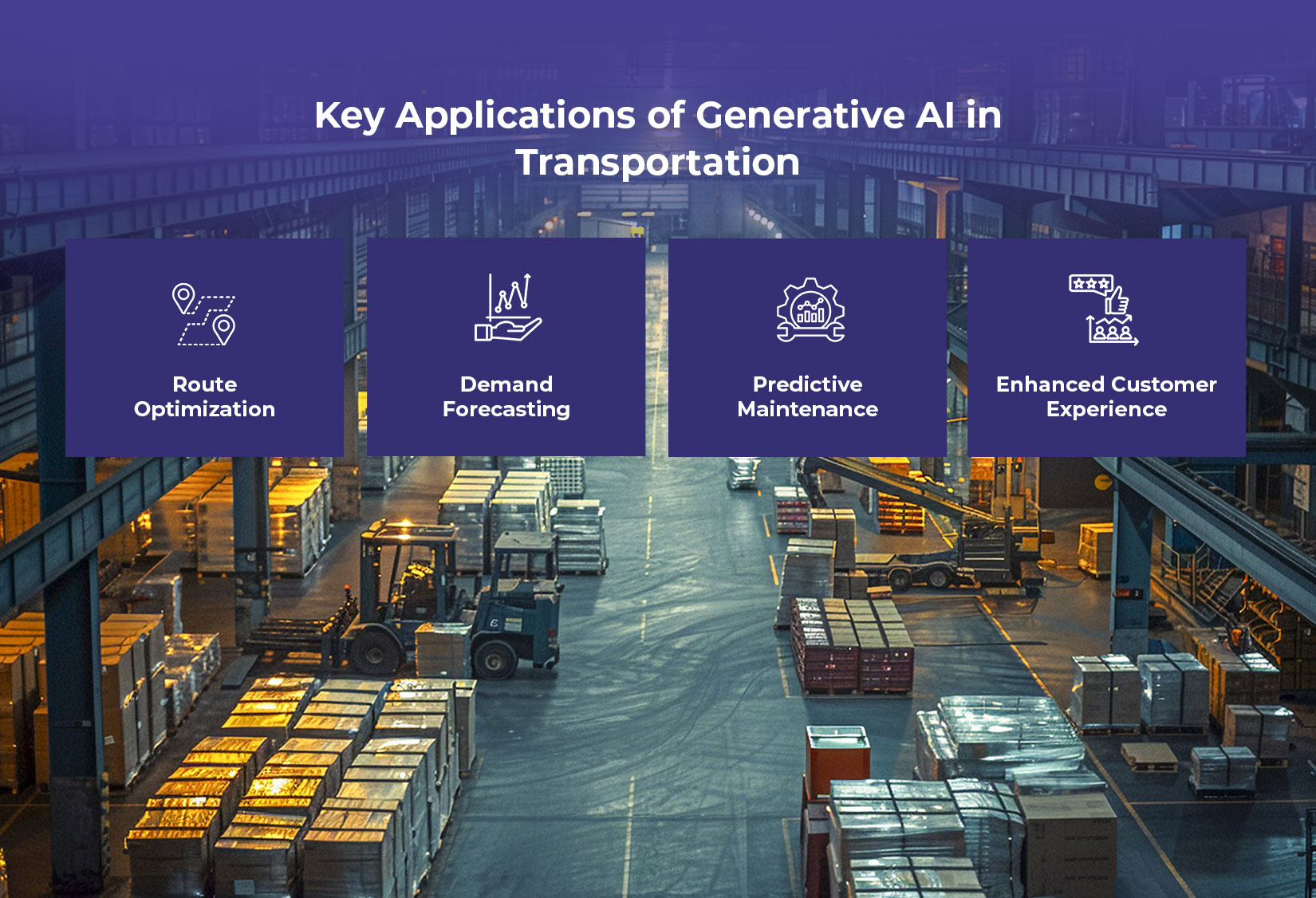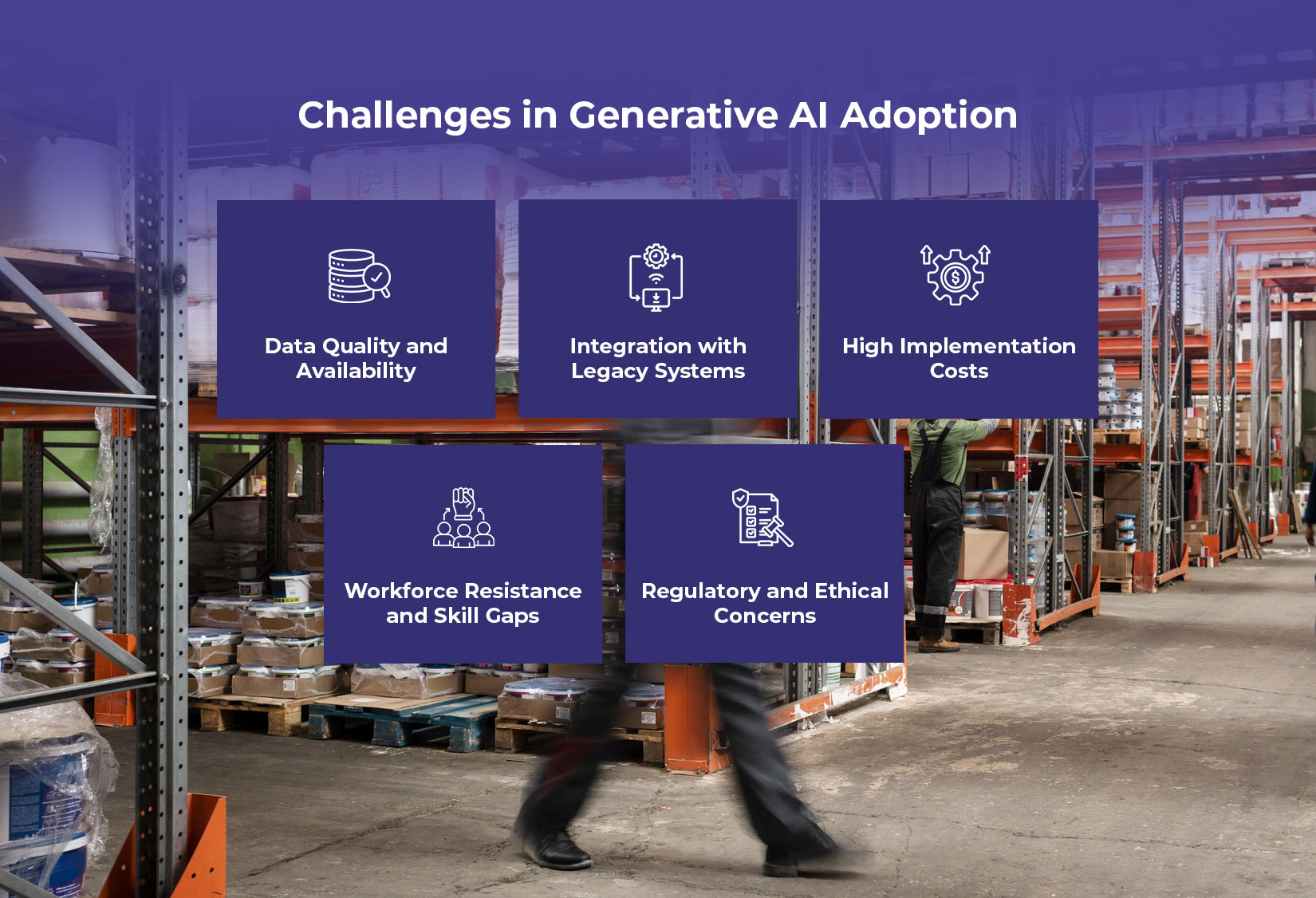The transportation industry has been a cornerstone of global commerce, ensuring the seamless movement of goods and people. Technology adoption in recent years has changed this industry, and generative artificial intelligence is a game-changer. Generative AI, a division of artificial intelligence capable of creating content, offers metamorphic possibilities in transportation management. From route optimization to predictive analytics, it is driving efficiency, cost savings, and sustainability.
What is Generative AI in Transportation?
Generative AI leverages machine learning models to analyze vast amounts of data and generate outputs such as predictive insights and even optimized solutions for logistics challenges. This technology is particularly beneficial for improving the operational efficiency of transportation management systems (TMS). TMS is a critical component in modern logistics.
A transportation management solution powered by generative AI can analyze historical data, weather patterns and traffic conditions. This can be used to suggest the best transportation management practices. These insights not only enhance operational decision-making buy also reduce costs by minimizing delays and improving fuel efficiency.
Key Applications of Generative AI in Transportation

1. Route Optimization:
Generative AI excels in analyzing variables like traffic, weather and vehicle performance to design optimal routes. A transportation management system integrated with AI can predict delays and reroute shipments dynamically. This reduces delivery times and cut fuel costs, improving overall supply chain efficiency.
2. Demand Forecasting:
Understanding demand fluctuations is crucial for logistics. AI-powered transportation management software processes historical data, market trends and external factors to predict demand accurately. Businesses can allocate resources more effectively, preventing underutilization or overcapacity.
3. Predictive Maintenance:
Equipment breakdowns disrupt operations and increase costs. Generative AI uses sensor data from vehicles to predict maintenance needs, ensuring proactive servicing. This improves fleet longevity and operational uptime.
4. Enhanced Customer Experience:
By automating tasks like shipment and real-time notifications, generative AI enhances customer satisfaction. Transportation management solutions can generate insights into delivery schedules, providing transparency to customers.
Industry Adoption and Success Stories
According to a report by McKinsey, companies that adopt AI-driven solutions in transportation can reduce logistics costs by up to 15%. Amazon, a leader in global-logistics, leverages AI for route planning and drone delivery, ensuring faster shipments. Similarly, UPS uses predictive analytics to save millions annually in fuel costs.
Small and medium sized enterprises (SMEs), also benefit from affordable AI-driven transportation management software, enabling them to complete in a technology-driven marketplace.
Challenges in Generative AI Adoption

Despite its advantages, implementing generative AI in transportation management comes with challenges:
1. Data Quality and Availability:
Generative AI thrives on high-quality data, but many organizations struggle with data silos, incomplete records or inconsistent. Poor data quality leads to inaccurate insights and reduces the efficacy of AI-driven solutions. Companies need robust data governance frameworks to ensure reliable data inputs.
2. Integration with Legacy Systems:
Many transportation companies still rely on outdated infrastructure. It can be difficult and expensive to integrate generative AI with outdated transportation management systems. It often requires significant upgrades or overhauls, which may disrupt operations in the short term.
3. High Implementation Costs:
While the long term benefits of AI-driven transportation management software are undeniable, the initial investment in AI tools, infrastructure and training can be prohibitive for smaller firms. Without sufficient resources, businesses may find it challenging to adopt this technology at scale.
4. Workforce Resistance and Skill Gaps:
The introduction of AI often leads to concerns about job displacement, making employees resistant to change. Additionally, there’s a notable skills gap, workers need training to operate and manage AI-enabled systems effectively. Companies must invest in upskilling their workforce to ensure smooth transitions.
5. Regulatory and Ethical Concerns:
The use of AI in transportation raises questions about data privacy, security, and ethical considerations. For instance, leveraging customer data for AI predictions must comply with regulations like GDPR or CCPA. Businesses must navigate these complexities to ensure compliance and maintain customer trust.
Addressing these barriers requires strategic planning, stakeholder collaboration, and incremental implementation to minimize disruptions and maximize ROI.
The Future of Generative AI in Transportation
The future of transportation management lies in smart, interconnected systems powered by AI. Emerging trends like autonomous vehicles, drone deliveries, and hyperloop systems rely heavily on generative AI for decision-making, navigation, and optimization. These technologies promise to redefine best transportation management practices by making logistics faster, safer, and more environmentally friendly.
One promising development is the rise of autonomous fleets. AI-driven systems will enable self-driving vehicles to communicate seamlessly with each other and adapt to real-time traffic conditions. This will drastically reduce human error, leading to fewer accidents and improved delivery times.
Sustainability will also be a focus. Governments and organizations are prioritizing greener logistics to meet global climate goals. Generative AI can optimize energy usage, recommend eco-friendly routes and suggest alternative modes of transportation, such as electric or hydrogen-powered vehicles. As a result, businesses can significantly lower their carbon footprints while maintaining efficiency.
Furthermore, improvements in AI-powered predictive analytics will keep improving consumer happiness, inventory control and demand forecasting. These systems will enable companies to adapt swiftly to changing market conditions, ensuring resilience and competitiveness in a dynamic environment.
Also Read: Top 5 Best Transportation Management System (TMS) In 2024
Conclusion
Generative AI is revolutionizing transportation management by offering innovative solutions to long-standing challenges. From optimizing routes to enhancing customer satisfaction, its applications are vast and impactful. Businesses adopting AI-driven transportation management software and systems can achieve significant cost savings, operational efficiency and sustainability.
As the transportation industry continues to evolve, leveraging cutting-edge technologies like generative AI will be imperative. Companies must invest strategically in the right tools and expertise to harness this potential fully. The journey to smarter logistics begins with a robust, AI-powered transportation management solution, like LogiNext Solutions. Generative AI is the key to thrive in the future, and LogiNext Solutions is the source of that key. So click on the red button and book a demo with LogiNext Solutions today.
Like





















